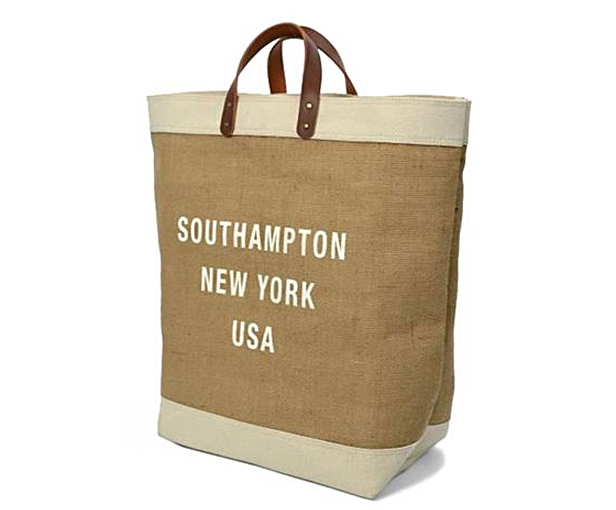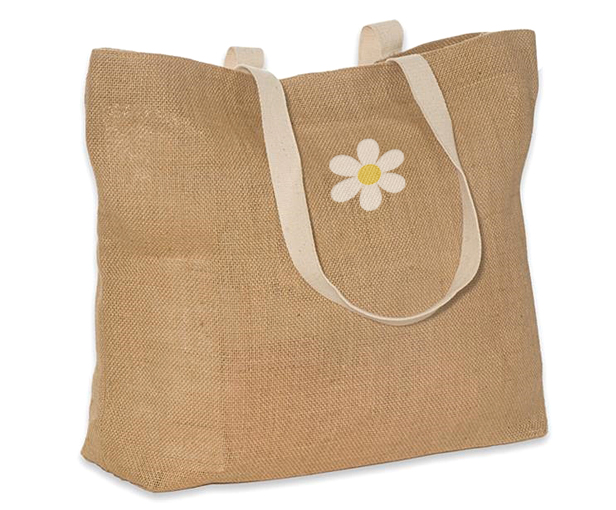Sustainability November 23, 2022
Jute Bags Bring Style to Sustainability
The biodegradable, natural material requires fewer resources to grow than cotton, and it’s more durable.
Reusable tote bags have been trending over the last few years, particularly as bans on single-use plastic bags proliferate in cities and states across the U.S.
Critics have noted that their very popularity has made them part of the problem – namely that there are simply too many totes to go around and that one organic cotton tote, for example, would need to be used 20,000 times to offset the overall climate impact of its production, according to a 2018 study.
Still, it’s undeniable that millions of tons of plastic – single-use bags among the litter – ends up in the ocean and other waterways each year, causing harm to wildlife. And people continue to seek out reusable totes made of alternative materials. Jute, a long, soft, shiny vegetable fiber that can be spun into coarse, but strong thread, has been seeing a resurgence, thanks to environmental concerns.
This canvas and jute burlap tote (BTB-6744) from LBU Inc. (asi/65952) also features leather handles with rivets and can be customized with a variety of features, including pockets, lining and handle sizing.
“Natural is fashion now,” Raghavendra Gupta, a top official at the Indian Jute Mills Association, told the New York Times. “There is nothing more eco-friendly than jute.” Gupta noted that the global jute bag market is expected to grow from $2.3 billion in 2021 to $3.38 billion in 2026. Shopping bags account for about a quarter of the jute products that India – the main manufacturer of jute – exported last year, according to Gupta.
Promotional products suppliers are seeing demand for jute bags as well. “Anything reusable or made of earth-friendly materials is trending,” says Walter Lewis, vice president of sales and business development at LBU Inc. (asi/65952), which specializes in highly customizable bags. Canvas is king, he adds, but jute is also growing in popularity.
Trends in tote bags from @lbuinc! pic.twitter.com/Re6ug3VjPz
— Theresa Hegel (@TheresaHegel) November 8, 2022
Jute bags are durable and reusable, but also biodegradable and compostable, giving it the sustainability story that many brands are seeking. They’re also made from a natural plant that grows easily and quickly and needs fewer resources than cotton does for cultivation. It also absorbs carbon dioxide at a higher rate than cotton.
This jute tote bag (LT-3430) is available from Prime Line (asi/79530).
“From a replenishment perspective, it’s a fairly stable commodity,” says Michelle Armstrong, director of merchandising for Prime Line (asi/79530), the hard goods division of Top 40 supplier alphabroder (asi/34063). “I do think [jute] will continue to grow in popularity, especially as petroleum-based products will continue to see price fluctuations due to ongoing global events.”
Farmers are able to sell multiple parts of jute: its leaves are a vegetable, the inner stem can be made into paper and the outer layer becomes the fiber turned into shopping bags. What’s left from the plant can be used to make things like charcoal or gunpowder.
As the popularity of jute grows and the industry looks to broaden its customer base, “companies are experimenting with the design, style and shape of jute bags, producing smaller souvenir bags for stores and hotels and larger bags for fashion houses and supermarkets,” according to The New York Times. “They’re also making new textiles by mixing cotton with jute.”
When it comes to adding a logo or other decoration onto a jute bag, Armstrong recommends transfer printing. “I think you can get the best color distribution and detail,” she notes.
Lewis of LBU encourages clients to think outside the box. The supplier has created custom totes where the handle becomes part of the decoration (a flamingo’s long next extending beyond the bag) or with clever design treatments (like a backpack for Franzia that doubles as a wine dispenser). Granted, those solutions weren’t made with jute, but the durable, rustic fabric also has possibilities for creativity.
“Custom’s not a bad word,” he adds. “It’s so simple.”

Promo for the Planet is your destination for the latest news, biggest trends and best ideas to help build a more sustainable and socially-responsible industry.


